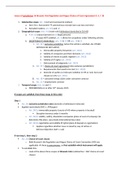Issues of jurisdiction Brussels I-bis Regulation and Hague Choice of Court Agreement (l. 6, 7, 8)
1. Substantive scope: Art. 1 (civil and commercial matters)
a. See LTU v. Eurocontrol autonomous concept (see case law overview)
b. Excluded matters: art. 1(1) and (2)
2. Geographical scope: Arts. 4-6 (main rule) [defendant domiciled in EU MS)
a. + art. 62 (natural person) or 63 (legal persons)
i. If scope NOT satisfied, art. 6 allows for exceptions under following articles:
b. EXCEPTIONS TO MAIN RULE: arts. 24 & 25 OR arts. 18 & 21
i. Art. 24 = exclusive jurisdiction (when this article is satisfied, ALL OTHER
ARTICLES DO NOT APPLY)
1. Immovable property/tenancies (art. 24(1))
2. Validity of companies and their decisions (art. 24(2))
3. Validity of entries in public registers (art. 24(3))
4. Validity of IP rights (art. 24(4))
5. Enforcement of judgments (art. 24(5))
ii. Art. 25 = choice-of-court agreement (also exclusive jurisdiction)
1. Requirements that need to be met (art. 25(1))
2. Domicile of parties is irrelevant (whether in MS or not), but court
chosen is in EU (art. 25(1))
iii. Art. 18 = consumer brings claim under consumer contract
iv. Art. 21 = employment contract
3. Temporal scope: Arts. 66 and 81
a. PROCEEDINGS on or after 10th January 2015
If scopes are satisfied, then these steps in this order
Step 1
Art. 24: exclusive jurisdiction rules (domicile of defendant irrelevant)
Applied restrictively (BVG v. JPMorgan)
o Art. 24(1): immovable property (courts of MS where property is located)
Exception tenancy under 6 months
o Art. 24(2): validity, nullity, dissolution companies (place of seat of company) (to
determine this place, use private international law rules)
o Art. 24(4): registration and validity IP rights (place of deposit or registration)
Applies regardless whether issue is raised by way of action or
defence/objection (GAT v. Luk)
If not step 1, then step 2
Art. 25: Choice-of-court clause
o Both Brussels I-bis Regulation and Hague Choice of Court Convention 2005 are
applicable there is concurrence, so first establish which instrument will apply
To establish this:
o Look at the above three scopes of Brussels I-bis (substantive = ANY choice-of-court
clause)
, o Hague Choice of Court Convention
Substantive: art. 3(a) [exclusive choice of court agreement]
Geographical: art. 1(1) [international case] + art. 3(a) [court chosen must be
CONTRACTING STATE, not EU MS]
Temporal: art. 16 [choice-of-court must be after entry force for chosen state]
If Brussels I-bis applicable is choice-of-court clause valid?:
o Formal validity
Art. 25(1)(a): In writing or evidenced in writing, or
MSG: oral agreement valid if subsequently put into writing
Art. 25(1)(b): In accordance with practices between parties, or
Art. 25(1)(c): In accordance with international trade or commerce usage
Transporti Castelletti: usage not necessary in all EU states, form of
publicity not always required
o Is satisfied, then substantive validity (p. 66 Bogdan)
Agreement in connection with a particular legal relationship (art. 25(1))
Pertain to disputes already arisen or may arise from legal
relationship in connection with which agreement was entered into.
Agreement must be between particular and specific parties
Powell v. Duffryn: relationship between company and shareholder is
sufficiently particular
Connection between court and parties/case not required (Castelletti)
May NOT deviate from art. 24 or conflict with arts. 15, 19, 23
o Effects of agreement
Court chosen has exclusive jurisdiction, unless non-exclusive jurisdiction
clause (art. 25(1)) (“Such jurisdiction shall be exclusive unless parties have
agreed otherwise”)
Lis pendens also apply in case of jurisdiction clause
Gasser: court second seized shall stay proceedings even if it is chosen
court in agreement)
If not step 2, then step 3
Weaker party protection rules
o Insurance (Section 3)
o Consumer (section 4)
o Employment (Section 5)
Step 1: qualification is the contract in question covered by the regulation/does it grant
weaker party protection?
o If it doesn’t fall under sections 3, 4, 5, then jurisdiction must be found on basis of
another ground (other articles)
o What type of contract? (insurance, consumer, employment)
o Which conditions must be met?
Step 2: if Regulation applicable/case falls under protection articles/contract is entitled to
protection which court has jurisdiction? (according to rules in the relevant section)
o Extra courts provided or exhaustive list?





